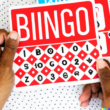There is no definitive answer to this question as it depends on the specific lAWS and regulations in each state. However, generally speaking, bingo is not considered gambling in most states.
This means that Bingo clubs and other businesses that offer bingo as a part of their regular entertainment offerings are not typically subject to the same regulations and lAWS that apply to casinos and other types of gambling establishments.
Some states, such as Michigan, do have specific statutes that regulate bingo activities. In Michigan, for example, bingo is considered a form of lottery and is subject to the same licensing and regulation requirements as other forms of lotteries.
This means that Bingo clubs must comply with requirements such as having a license from the state department of gaming and gambling, ensuring players are of legal age, and providing accurate information about game rules and probabilities.
However, even in states where bingo is not typically classified as gambling, there may be certain circumstances in which it may be considered an illegal form of entertainment. In these cases, it would be illegal for anyone involved in the operation of a bingo club or game to allow anyone under the age of 21 to participate in the activity.
Additionally, it would be illegal for any club or individual to charge any player more than the cost of a ticket for participation in the game.







